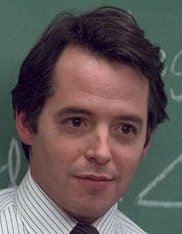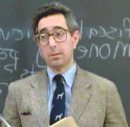
 This article at Inside Higher Ed does a good job of summarizing the new “Intelligent” Design movie, Expelled: No Intelligence Allowed. Is it just me, but does anyone really think that chronic D-list Republican celeb Ben Stein is really a “powerful new weapon” in the war to admit pseudo-science into public school classrooms? He had an amusing cameo in a movie that came out when Historiann was in High School, twenty-two years ago, which was itself amusingly parodied by “Ferris Bueller” himself in Election (1999). But, who really cares what Ben Stein thinks about anything? He’s not that smart, and not that popular with High School kids, or anyone else, these days.
This article at Inside Higher Ed does a good job of summarizing the new “Intelligent” Design movie, Expelled: No Intelligence Allowed. Is it just me, but does anyone really think that chronic D-list Republican celeb Ben Stein is really a “powerful new weapon” in the war to admit pseudo-science into public school classrooms? He had an amusing cameo in a movie that came out when Historiann was in High School, twenty-two years ago, which was itself amusingly parodied by “Ferris Bueller” himself in Election (1999). But, who really cares what Ben Stein thinks about anything? He’s not that smart, and not that popular with High School kids, or anyone else, these days.
But then if what you’re selling is “Intelligent” Design, then maybe Ben Stein is “powerful,” in the way that ID is “intelligent.”
UPDATE: It’s a regular John Hughes revival today: tonight, All Things Considered did a story about the character “Long Duk Dong” from Hughes’ 1984 movie, Sixteen Candles, and the controversy over the racist stereotype of Asian men he (at the instigation of writer/director Hughes) revived and embodied. (Don’t miss the link to Adrian Tomine’s 2001 graphic story, “The Donger and Me”–it illustrates the burden that Long Duk Dong was for Asian American boys in the 1980s.) And here’s something from the department of “you’re getting old, dude”: the actor who played Long Duk Dong, Gedde Watanabe, is fifty-two! Check it out–after all, how many times have you had the opportunity to hear an NPR reporter use the expression “butt-cut” on the air?
Ben Stein was a Nixon speechwriter.
Never trust a word he says.
LikeLike
88.
We’ve had a bit of a Hughes “brat pack” marathon here as well on Danish TV.
“The Breakfast Club” was my favorite.
…but I watch these films now with a mixture of nostalgia and trepidation.
I think Watanabe was the only non-white character in any of Hughes’ movies, not counting the Black and Latino ex-con parking attendants in “Ferris Bueller’s Day Off.”
Watanabe’s character in “16 Candles”, Long Duk Dong, a Chinese exchange student, had the character theme song, “Turning Japanese” by the Vapors, supposedly a song about male masturbation. I guess Chinese, Japanese, same thing for Hughes.
Just the other day, “Gremlins 2” (not a Hughes film) aired, and there was Watanabe, playing the goofy, camera laden Japanese tourist. Where his role in 16 Candles, was admittedly funny, in so far as we can laugh at overtly racists stereotypes, here it was just one very bad joke.
Furthermore, the Hughes films represented an utterly deceptive portrayal of class in America. Basically, all of America was white and middle class, with a comfortable “average income middle class” that lived in suburban harmony with an upper middle class who all play golf and drive luxury European automobiles. Oh, there are of course a few “others” from the “wrong side of the tracks” like Ringwald’s character in Pretty and Pink, and Judd Nelson’s Breakfast Club character, representing the working class. There characters and others like it, so the message goes, wouldn’t be working class had their parents just stopped drinking or cursing the system. It’s hard for me not to see Hughes as part of the cultural “White washing” of a whole generation of teenage Reagan-era suburbanites.
However, films like Ben Stein’s “Expelled: No Intelligence Allowed” make me long for the “innocence” of the Reagan years.
LikeLike
Stuart writes, “. . . a whole generation of teenage Reagan-era suburbanites.”
Historiann resembles that remark!
Great analysis. John Hughes’s 1980s high schools were like Woody Allen’s or Jerry Seinfeld’s New York, where the only “ethnic diversity” is Jewish/not-Jewish. (And in Seinfeld, even that divide was suppressed!)
LikeLike
Pingback: Changing Your Behavior Isn't Enough - The Wealth Gospel